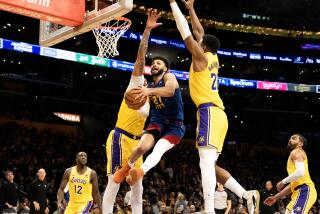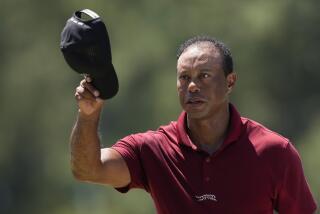Woods drops the ball
AUGUSTA, GA. — Opportunities of magnitude, life-changing moments, should be seized and cherished. Tiger Woods had one Saturday at the Masters, and he shanked it. Same for tournament officials.
This is not so much a golf tournament as it is a monument to sport the way it should be. It wears it on its sleeve, preaches it to the masses.
Fred Ridley, chairman of the competition committee and a man in the eye of a hurricane, along with Woods, stated firmly during an appearance in front of various media, “Integrity has been the underpinning of this tournament.”
That’s why what happened remains so curious.
In quick summary, Woods made an improper drop after he hit a shot in the water Friday. A TV viewer saw it, called in, Ridley and his rules committee reviewed film and decided the drop was all right.
Nobody spoke to Woods. Ridley got a call at dinner from CBS people, suggesting he listen to an interview in which Woods said he purposely took the drop a few yards back to help his next shot. That would constitute intent to improve one’s lie, a violation of the rules.
Woods didn’t do so on purpose. He didn’t understand the rule. When called in early Saturday, he said truthfully what he did and why. That prompted Ridley and his committee to assess a two-shot penalty, meaning Woods started the day one-under par, not three-under.
Here’s where it really gets messy.
Woods had signed an incorrect scorecard. He didn’t know that at the time, but he had. Usually, that’s zero tolerance in golf, similar to an Olympic athlete who takes something not realizing it will get him or her tested positive for drugs. Not knowing, not understanding, is no excuse -- in Olympic drug testing or golf scorecard-signing.
The complication here was that golf had, two years ago, instituted a cover-its-rear, second-chance rule, something using words about “the best discretion of officials.” In any sport or walk of life, a rule like that means people in charge can do what they want, play the necessary cards to bring the most advantageous outcome.
At the Masters, the most advantageous outcome is having Tiger Woods on the TV screen Sunday afternoon. Woods violated a rule, signed a card that didn’t include the two strokes that violation constituted and was allowed to play on by a Masters committee, which took the fall for him. He shot a 70 on Saturday and trails by four shots.
To be fair, because there is no way to get inside people’s heads, that committee decision may have been totally driven by fairness and “integrity.” But in an increasingly cynical world, one that embraces conspiracy theories, it’s tough to avoid a frown here.
Then, there was Woods’ golden opportunity, not unexpectedly shrugged off.
Former players -- even some current ones speaking anonymously -- weighed in that this was a time for Woods to withdraw, that violating a rule and signing an incorrect card meant disqualification. Nick Faldo said it on TV. So did Brad Faxon, who added the fascinating imagery of saying, had it been him, he’d be in the parking lot “slamming the trunk.”
Faldo, interestingly, reversed himself when the CBS telecast began.
“I’ve changed my mind on this,” he said.
The depth of love in the marriage between the Masters and CBS is unquestioned. The depth of influence the tournament might have on its broadcast partners, especially its on-air stars, is unknown.
Sadly, Woods four-putted his big chance.
He is a golfing treasure, either the best or second-best of all time. He also has a yet-unrepaired public relations problem. When he made a mess of his marriage in the worst public way back in 2009, he polarized a huge fan base.
Interestingly, his first best opportunity to begin fixing that, for an era of sports fans that are both worshiping and forgiving, was at the 2010 Masters. He needed to smile more, embrace the public more, stress personal humanity more than professional titles. We got none of that. The snarling intensity of win-at-all-costs, accented by thrown clubs and cursed bad shots, remained his persona.
Slowly, as he has come back to the golfing greatness that defines him, he has shown signs of caring about repairing that image.
That made a voluntary withdrawal by Woods here a two-foot putt.
Cite the same “integrity” of the place that Ridley did. Point out that, at 37, he still has plenty of time for major titles, but few chances to do the right thing, for golf, sport and sportsmanship. Acknowledge the example of so many of his peers, who have called penalties on themselves and “slammed the trunk,” who have put the bigger picture first.
Sunday, the same day Woods walks the fairways of Augusta National with impenetrable focus on winning yet another Masters title, will be Roberto De Vicenzo’s 90th birthday. De Vicenzo once lost a Masters title, after he had won it on the course, for signing an incorrect scorecard.
De Vicenzo failed only in math, Woods in judgment.
--
More to Read
Go beyond the scoreboard
Get the latest on L.A.'s teams in the daily Sports Report newsletter.
You may occasionally receive promotional content from the Los Angeles Times.







